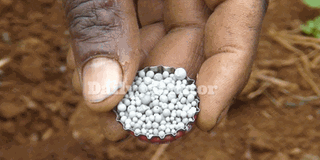Study: Fertiliser quality lowering yields

A farmer displays samples of DAP fertilizer.
In a study conducted in Tanzania and Kenya by researchers from the University of Illinois in the US, farmer misconception on the quality of fertilisers was found to be a major reason for them using fertiliser at well below the recommended rates. This contributes to low crop yields and poverty across Sub-Saharan Africa.
Despite these misgivings, the study concluded there was a marginal drop in quality for just a small percentage of locally available fertilisers. There was also no widespread evidence of the fraud and quality problems farmers worried about.
Small-scale farmers in Tanzania and Kenya, apply just 13 kilogrammes of fertiliser per hectare, compared with 165 to 175 kilogrammes applied by farmers in India and Brazil.
This directly contributes to low yields of cereals and other crops, which average 1.2 to 1.7 metric tonnes per hectare compared to 4 to 4.5 metric tonnes harvested by farmers in South America and Asia. For smallholder farmers in Sub-Saharan Africa, purchasing fertiliser is a substantial expense, amounting to about 10 per cent of annual per capita income in the household.
It is a non-trivial investment that comes with a measure of risk. And they are not willing to make that investment if they do not believe it will be worth the cost, Hope Michelson, associate professor in the Department of Agricultural and Consumer Economics at the University of Illinois explains.
“Farmers were not using much fertiliser; that’s well established in the region of Kenya and Tanzania where we were working. In discussions with farmers, we heard again and again the explanation was they thought the fertiliser was fake or bad, and they didn’t want to buy it,” Michelson says.
“We found evidence that farmers worry about the quality of the fertiliser in the marketplace, and that impacts their willingness to pay for it. This can affect the amount of fertiliser they’re buying, and whether or not they purchase fertiliser at all,” Michelson states.




